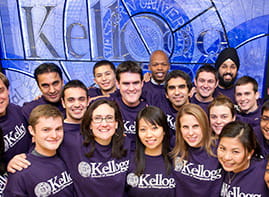1/20/2015 -
Editor's Note: In the Start Me Up series, the Kellogg School spotlights young members of the Kellogg community who are bringing bold entrepreneurial visions to life.
What happens when you start a business at age 22, grow it into a $20 million company and then lose it all in a day?
If you’re Frank Muscarello ’03 (EMP-55), you start another company. And this time, you build a better one.
In Muscarello’s case, that company is
MarkITx, an online marketplace for trading enterprise hardware. Co-founded by the Chicago native in 2012, the company has quickly become a game-changer for secondary IT.
In less than two years, MarkITx has squashed any revenue numbers posted by Muscarello’s first company, Vision Point of Sale, during its 16-year run. This year’s revenue for MarkITx is up 377 percent compared to last. After only eight months of operations, the company earned a whopping $12 million valuation. And, according to Muscarello, MarkITx is projected to exceed $1 billion in the next five years.
A market worth watching
MarkITx functions like a stock market for secondary IT, aggregating supply and demand in one central place while using real-time data to deliver pricing baselines and connecting buyers and sellers anonymously. It was founded on a simple premise: IT hardware is a commodity, so should be traded like one.
Say you’re Chase Bank, and you need to purge your inventory of servers, storage and networking equipment to make way for the latest and greatest equipment. Normally, you’d trade the equipment back to your original manufacturer or sell it brokers looking to arbitrage— such as CISCO or Juniper — and get a fraction of its value in return.
But with MarkITx, you can sell your equipment to another organization on the marketplace at a fair price, reaping up to 40 percent of your original investment. You can also have MarkITx manage the painful process of picking up, inspecting, data destruction and refurbishing your gear for a small fee. In exchange, the company takes a 20 percent cut of the commission.
MarkITx also helps companies figure out the optimal time to refresh their IT, offering a dashboard that plugs into companies via API and uses real-time data to monitor the mark-to-market value of their assets.
While its services are inherently sticky, MarkITx’s online exchange brings transparency and efficiency to a market that Muscarello says was once “very used-car-esque” — plagued by risky transactions and unethical pricing schemes.
Moving those transactions online has changed everything. “Data is really what’s unlocking liquidity,” he says, “and where the true value is for the entire ecosystem.”
The rise and fall of arbitrage
You can trace the origins of MarkITx back to Muscarello’s college days, when he was interning for the now-bankrupt Comdisco, Inc., a company that leased, refurbished and resold high-tech assets. VPOS, the company that Muscarello co-founded in 1993 after earning his bachelor’s degree (and becoming the first in his family to graduate college), had a somewhat similar model: It bought, refurbished and sold point-of-sale devices, such as cash registers.
While VPOS was highly lucrative — in one transaction, for example, the company bought registers for $17,000 and sold them the next day for $700,000 — Muscarello started wondering if there was a better way to run the business. In 2001, he enrolled in Kellogg’s Executive MBA Program to seek out those answers and pay tribute to his late father, who had taken night classes at Northwestern University. Kellogg had a “profound impact … on my development,” Muscarello says. “I got energy from [my peers in the program] and I know I gave energy to them.”
That educational training also helped Muscarello recognize that VPOS had an Achilles heel: Managing a physical inventory of devices was an impediment to scale. Eventually, when the 2008 economic crisis hit, he was stuck with an expensive inventory with few buyers, contributing to VPOS’s downfall.
Sow supply, reap demand
When the time came to build MarkITx, Muscarello did things differently. He designed a business that was strictly hands-off when it came to managing inventory. Instead, he hired vendors to transport and refurbish the equipment on the company’s behalf. He also created a platform with a proprietary algorithms that used data to determine the market value of the equipment so MarkITx could take a neutral stance on pricing.
To take those ideas from concept to market, he enrolled at 1871 and recruited co-founder Ben Blair, a serial entrepreneur and former developer at PEAK6 who helped build the platform in less than two months. Meanwhile, Muscarello started cold-calling financial services companies to see if they’d serve as suppliers on the exchange. He knew that these firms were ideal targets; not only did they refresh their IT inventory frequently, but the company’s business model would “resonate with them because they understood liquidity, the value in creating efficient markets, technology and the power of transparency,” he says.
Muscarello’s plan also brought him back to Kellogg. Recently, he hosted a
faculty immersion visit at MarkITx’s headquarters in Chicago, where his staff and a cross-disciplinary group of faculty members discussed how data analytics principles can be applied to MarkITx’s business model.
While MarkITx’s outlook is optimistic, Muscarello cautions that, “We’re not doing anything relative to what we can do.” He points to the fact that secondary IT is a $312 billion market, and MarkITx wants to dominate it.
“This business is not sexy by any stretch of the imagination,” he adds. “If I tell my kids we’re building a neutral market to disrupt the way the world trades IT, they look at me like, ‘Why don’t you build Instagram instead?’
“Over time, when this sells for a billion dollars … they’ll thank me.”
Read more in the Start Me Up Series:






